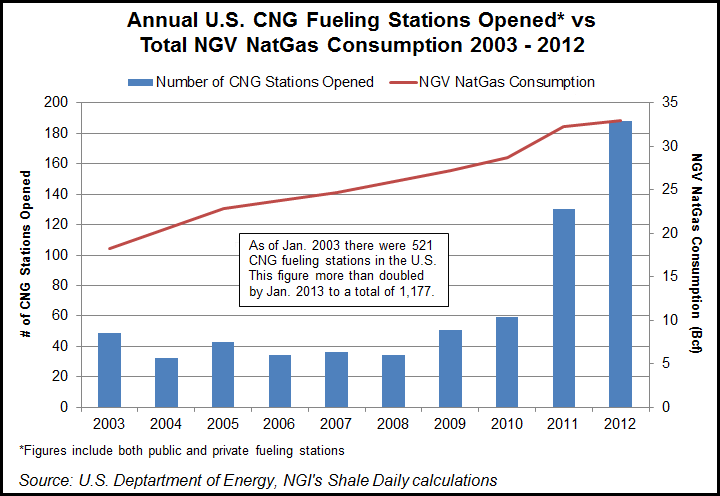Marcellus | NGI All News Access
Range Resources Touts 184 CNG Vehicles In the Field
Lauding General Motors Corp. and the Chrysler Group, Range Resources Corp. senior officials on Wednesday declared their fleet operations in Pennsylvania, Oklahoma and other states now operate almost entirely on natural gas.

Range sponsored an event in its Southern Marcellus Shale Division south of Pittsburgh, PA, for public- and private-sector representatives to discuss various issues and attributes of natural gas as a cleaner transportation fuel, noting it now has 184 compressed natural gas (CNG) vehicles in its corporate fleet, with 100 of them stationed in southwest Pennsylvania.
The Fort Worth, TX-based drilling company said it has purchased both Chevrolet Silverado 2500 and Ram 2500 pickup trucks from GM and Chrysler, respectively.
“Both GM and Chrysler Group deserve a tremendous amount of credit for providing natural gas-powered transportation options direct from the factory,” said Range COO Ray Walker, adding that demand is growing for CNG vehicles as more consumers, businesses and public transit operators realize the fuel’s cost-savings and environmental advantages compared to gasoline or diesel.
CNG demand for natural gas vehicles has been growing at a steady rate since 2003, when 18.3 Bcf was consumed by the segment, according to U.S. Department of Energy (DOE) data. For 2012 that number had grown to 32.9 Bcf.
Supportive CNG infrastructure, one of the major hurdles to widespread adoption, is also being addressed. From 2003 to 2010, the number of new public and private CNG vehicle fueling stations being added each year across the United States was fairly stagnant. However, the numbers began to jump in 2011. According to DOE data, 59 CNG stations were opened in 2010, followed by 130 in 2011 and 188 in 2012. Through 2012, there were 1,177 public and private vehicle fueling stations across the country.
Officials from GM, Chrysler and the Pittsburgh Regional Clean Cities program attended the meeting at the Range Southern Marcellus offices. GM’s Mark Karney, alternative fuels director, said he expected CNG vehicle demand to grow as more styles and models are offered.
“Not only does CNG provide our nation with a stronger, more balanced energy portfolio, but it enhances our national security, our environment and our economy,” Walker said.
Speaking earlier this month on a panel at the Rocky Mountain Energy Summit sponsored by the Colorado Oil and Gas Association, former U.S. Department of Energy (DOE) official Jeff Navin, who is now a partner in consulting firm Boundary Stone Partners in Washington, DC, said the energy industry finds itself in a period where oil and natural gas are now competing with each other (see Shale Daily, Aug. 8).
Major truckers are moving as “rapidly as they can away from diesel to natural gas…Electric vehicles (EV) are growing more rapidly than hybrids…Ford is offering its best-selling F-150 with a compressed natural gas engine…”
However, “the reality is EVs won’t take over, and there will be more gasoline-fired Ford F-150s than those fueled by CNG,” Navin said. “But that incrementalism matters when you are talking about increments here and there…especially when margins are high. Those little things make a difference.”
© 2024 Natural Gas Intelligence. All rights reserved.
ISSN © 2577-9877 | ISSN © 2158-8023 |

